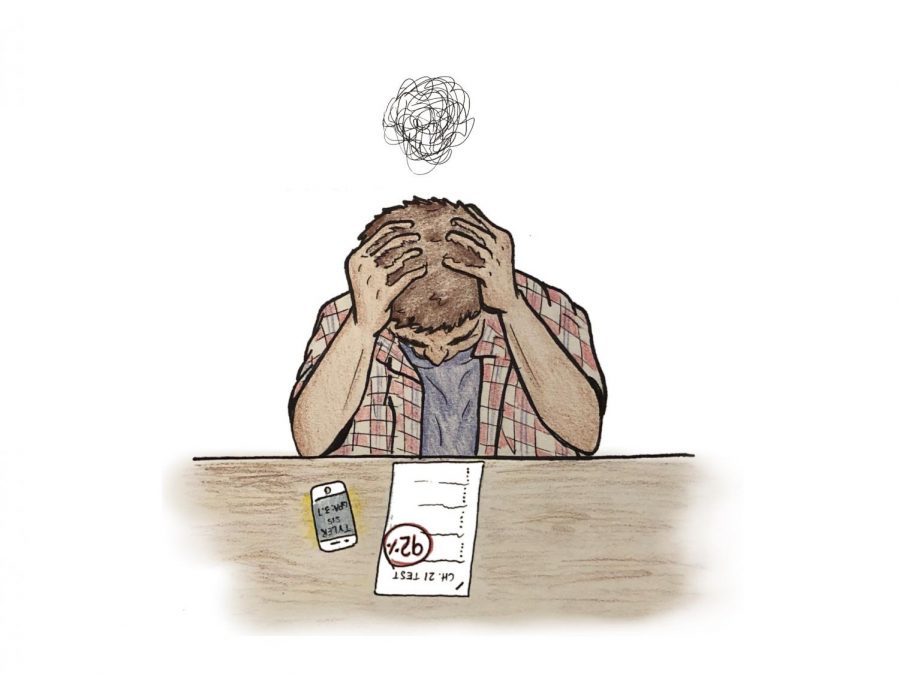Identity Crisis
For many students, attempting to live up to the label of being “smart” can start to have negative consequences– especially when it defines who you are.
With an increasing weight on intelligence, we wonder why did doing great become not good enough?
Every time someone asks me to describe myself, one of the first words that come to mind is “smart.” It’s not a matter of arrogance or an attempt to brag. It simply feels like a fact– something I, like many of my other classmates, was raised to believe. It’s something that so many of us have heard constantly since first grade because apparently future intellect can be determined by a six-year-old’s spelling test scores.
In many ways, being smart is a compliment. However, when I tell someone I’m smart, it shockingly comes out like a descriptor of who I am. It’s not an opinion or even a good thing. It’s an adjective that falls into the same category as height or hair color.
Feeling smart isn’t the issue. It’s the need to continue to live up to that. It’s the need to still feel exceptionally intelligent and to keep the highest grades in classes that just get harder.
Worst of all, it’s the identity crisis that comes if you can’t reach those expectations. You feel like you aren’t yourself like there’s suddenly something very wrong. Panic sets in. Everything else in your life feels… off.
If I can’t take a test, what else can’t I do? What else is wrong? Why can’t I do it? When did I fall so behind everyone else?
That alarm that many students feel isn’t even justified in the slightest. I’m not talking about getting a D on a test and being upset. I’m talking about seeing a line of 92’s in the grade book and feeling the weight of the world on your shoulders.
They’re A’s, I tell myself, but why isn’t that enough?
That’s exactly the question: why? Why do so many of us feel like we’re missing a piece of ourselves when we’re still doing exceptionally well?
It’s like we’ve all been given the impression that being smart has to be equivalent to being perfect.
I’m fortunate enough to say that I have, personally, never felt pressure from my parents or from the school to succeed– at least not directly. I was just always taught to try my best. I was continuously told that, as long as I worked hard, the percentage or letter grade that so many of us define ourselves by wouldn’t really matter. And I’m extremely grateful for that.
However, it didn’t do much good when I, like a majority of my classmates, was simultaneously told how talented I was– how fast I could read and how well I could solve a math problem. Most of us were considered bright in that very similar way. We all live in a wealthy school district that has extremely strong academics. It only made sense that when we got our PSSA scores back we were in the top percentile.
Since our early grade school days, some people have shaken off the label of “smart”.They embraced other descriptors, like “artistic” or “athletic.” Or maybe they chose to define themselves.
Some of us, though, are still stuck in the world of test scores and percentiles and essays.
And maybe it’s not all that bad, but it requires keeping up with the continuous ways our education systems measure intelligence. I can’t say I’m all that smart if I do bad on that test, can I? I can’t say that I’m as smart as everyone else if my A’s aren’t as high as theirs, right?
Having a ton of gifted kids with that mindset thrown together in a classroom can create a toxic environment. You feel the competition among peers. You dread your test scores that you just know are going to be compared to everyone else’s. Granted, I may be a little more competitive than most, but I know I’m not alone in constantly questioning just how smart I am in a room full of kids who have also always been labeled as intelligent.
I guess being talented in a school where everyone is talented is a bit of a gift and a curse.
Sometimes, I’ll think I’ve broken the curse. Recently, I started trying to define myself outside of our school walls, whether it be with a sport or other extracurriculars. I’ll get slightly better at controlling the rise of panic in my chest when I check the grade book. I’ll feel a little less stressed and a little more well-rounded. But just when I start to believe I am more than my grades… I get a bad test score. The uncomfortable feeling comes back. My world gets turned upside down once again. And I realize that the vicious cycle will continue.
I don’t know who to blame for it. I wish I did. The sad part is, I don’t know who convinced me I had to keep being smart because I don’t remember a time when I didn’t feel that pressure. I’ve felt the weight of that label for as long as I’ve been me.
Sure, it may be a self-inflicted issue. I could always stop caring. But how do you fight every instinct you have? How do you allow yourself to believe you’re more when you’ve never been shown you can be?
And just how self-inflicted can it be if so much of the student body feels the exact same pressure?
Being a good student in a school like North Allegheny can be consuming. It swallows you whole until it’s all that matters. The hours of homework, all the fancy high-level classes, all the accomplished, overachieving kids.
It shouldn’t be like that. It doesn’t have to be. It’s all about how we chose to define being smart and how we treat kids who display any kind of spark or sense of creativity.
I can picture a little girl that’s told she’s not talented because of her intelligence but in addition to it. She’s informed that she’s going to go places not because she can read fast, but because she is enthusiastic and works hard. She’ll grow up learning that being smart isn’t defined as getting a good test score. It’s more about how she’s curious and loves to explore.
Maybe I was told those things, too. I’m sure that’s the intention my teachers had. But for me and many of my peers, that message didn’t stick. So, we need to be better.
Because kids who aren’t chasing a grade are following their passions without a second thought. They’re taking risks and smiling and doing what they love. They’re displaying all their talent beyond how our schools choose to measure it.
I’m going try to do that, too, as I imagine many others are. Redefining yourself is hard, which is exactly why I want to scream from the rooftops that you’re not alone to feel that panic. You’re not alone to feel behind when in all reality you’re doing great. You’re not alone to feel the constant need to be better– to finally be good enough.
It’s time we stop making the daunting task of continuing to be smart a burden instead of treating it like a gift. Regardless, intelligence shouldn’t be a defining characteristic. It shouldn’t be who I am, because no one should be one thing.
And I certainly shouldn’t feel like I’m questioning my whole identity every time I check Tyler.

Kristen Kinzler is a sophomore at North Allegheny Intermediate High School. This is her first year as a journalist on the newspaper staff. She loves playing...



